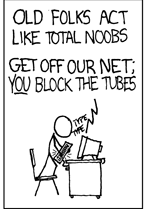 Positions on
future uses of the 700Mhz spectrum formerly occupied by analog TV
aren’t just for
presidential candidates
anymore.
Congress is hearing arguments:
Positions on
future uses of the 700Mhz spectrum formerly occupied by analog TV
aren’t just for
presidential candidates
anymore.
Congress is hearing arguments:
Rep. Edward J. Markey (D-Mass.), who chairs the subcommittee that handles telecommunications and Internet issues, urged the FCC to “seize this opportunity to create an open-access opportunity for wireless service in this auction.” He added that wireless carriers are “exerting far too much control over the features, functions and applications that wireless gadget makers and content entrepreneurs can offer directly to consumers.”Some search, VoIP, and computer companies say auctioning off some of that spectrum with open access requirements would promote competition, while telcos claim it would hurt their investments, stifle competition, and reduce revenues to the government from the auction. I think it may well reduce direct government auction revenues, but the economic benefits of real competition should be worth it. You’d think the nominally free market supporting telcos would agree with that. Continue reading— FCC Auction Should Allow for Open Wireless Network, Say Lawmakers, By Kim Hart, Washington Post Staff Writer, Thursday, July 12, 2007; Page D08










